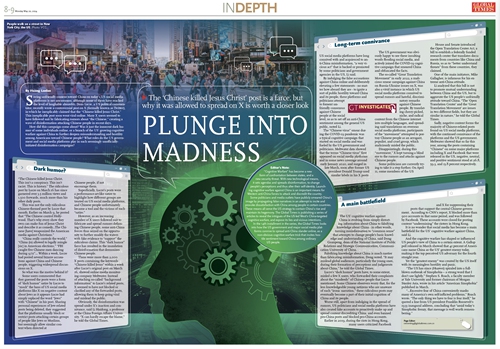Plunge into madness
"Cognitive Warfare" has become a new form of confrontation between states, and a new security threat. With new technological means, it sets agendas and spreads disinformation, to change people's perceptions and thus alter their self-identity. Launching cognitive warfare against China is an important means for Western anti-China forces to attack and discredit the country.
Some politicians and media outlets have publicly smeared China's image by propagating false narratives in an attempt to incite and provoke dissatisfaction with China among people in certain countries. These means all serve the US strategy to contain China's rise and maintain its hegemony. The Global Times is publishing a series of articles to reveal the intrigues of the US-led West's China-targeted cognitive warfare, and expose its lies and vicious intentions.
In the 14th installment in the series, the Global Times looks into how the US government and major social media platforms connive to spread anti-China slander online, as a non-obvious cognitive warfare trick that incites hostile sentiment toward China among ordinary US people.

People walk on a street in New York City, the US. Photo: VCG
Seeing unfriendly content toward China on today's US social media platforms is not uncommon, although some of them have reached the level of laughable absurdity. Dom Lucre, a US political commentator, recently wrote a controversial post on X (formally known as Twitter), in which he inexplicably claimed that the "Chinese killed Jesus Christ." This inexplicable post soon went viral online. Many X users seemed to have followed suit by fabricating rumors about "the Chinese," creating a wave of disinformation attacking Chinese people in recent days.How did this campaign come about? Was it just the innocent dark humor of some individuals online, or a branch of the US' growing cognitive warfare against China to further deepen misunderstanding and hostility among Americans toward Chinese people? What roles do the US government and social media platforms play in such seemingly unofficially-initiated disinformation campaigns?
Dark humor?
"The Chinese killed Jesus Christ. This isn't a conspiracy. This isn't racist. This is history." The ridiculous post by Lucre on March 16 has since garnered over 3.5 million views and 1,500 forwards, much more than his other daily posts.
This was not the only ridiculous Chinese-themed post by Lucre that month. Earlier on March 9, he posted that "The Chinese control Hollywood. That's why every show they own can make fun of Jesus Christ and describe it as comedy…The Chinese [have] weaponized the American media against Christians."
"China really controls the world," "China (is) allowed to legally mingle [sic] in American elections," "FBI caught five Chinese men dancing during 9/11"… Within a week, Lucre had posted several bizarre accusations against China and Chinese people, triggering widespread discussions on X.
So what was the motive behind it?
Some users commented that they guessed the posts were a form of "dark humor" satire by Lucre to "mock" the bans of US social media platforms like X on negative content about Jews as it appears Lucre had simply replaced the word "Jews" with "Chinese" in his post. Sharing personal experiences of Jew-related posts being deleted, they suggested that the platforms usually block or restrict posts attacking certain groups of people like Jews or Muslims, but seemingly allow similar content when directed at Chinese people, if not encourage them.
Superficially, Lucre's posts were a performance-art-like satire to highlight how different groups are treated on US social media platforms, and Chinese people unfortunately became a tool and the victims of such "satire."
However, as an increasing number of X users followed suit to fabricate and spread rumors defaming Chinese people, some anti-China forces thus seized on the opportunity to further muddy the waters with fake evidence to "support" the ridiculous claims. This "dark humor" farce has resulted in the inundation of disinformation that demonizes Chinese people.
There were more than 2,000 X posts containing the keywords "Chinese killed Jesus" within a week after Lucre's original post on March 16, showed online media monitoring company Meltwater. Instead of attaching so-called "background information" to Lucre's related posts, X seemed to have not blocked or clarified any of the forwarded posts, allowing them to keep going viral and mislead the public.
Obviously, the disinformation was spread under X's inaction and connivance, said Li Haidong, a professor at the China Foreign Affairs University. "X can hardly escape the blame," he told the Global Times.
Long-term connivance
US social media platforms have long connived with and acquiesced to anti-China misinformation, "a very vicious act" that is backed or promoted by some politicians and government agencies in the US, Li said.
By indulging the false accusations against China online and deliberately elevating a few statements - no matter how absurd they are - to ignite a sort of public hostility toward China and its people, these platforms and politicians attempt to foment unfriendly consensus against Chinese people at the social level, so as to set off an anti-China sentiment among the general US public, noted Li.
The "Chinese virus" smear during the COVID-19 pandemic was a typical cognitive campaign that started on social media and was fueled by the US government and politicians. Meltwater data showed that the terms "Chinese virus" first appeared on social media platforms and in some news coverage around early January 2020, and surged in late March, soon after former US president Donald Trump used similar labels in his X posts
The US government was obviously happy to see these insulting words flooding social media, and actively joined the COVID-19 cognitive campaign that smeared China and obfuscated the facts.
The so-called "Great Translation Movement" in early 2022, a malicious smear campaign against China on Russia-Ukraine issues on X, was also a vivid instance in which US social media platforms connived to spread rumors and hateful, discriminatory remarks against Chinese people. By translating cherry-picked, niche, and radical content from the Chinese internet into multiple languages, and spreading said translations on overseas social media platforms, participants of the "movement" attempted to portray Chinese people as an arrogant, populist, and cruel group, which maliciously misled the public.
Disappointingly, during this "movement," X kept turning a blind eye to the rumors and attacks against Chinese people.
Some politicians are currently trying to take it a step further. On April 11, some members of the US House and Senate introduced the Open Translation Center Act, a bill to establish a federally funded research center that translates documents from countries like China and Russia, so as to "better understand threats" from these countries, they claimed.
One of the main initiators, Mike Gallagher, is infamous for his extreme anti-China attitude.
Li analyzed that this bill is not to promote mutual understanding between China and the US, but to aggravate the US people's unfriendly attitude toward China. "The 'Open Translation Center' and the 'Great Translation Movement' are issues in two different fields, but they are similar in nature," he told the Global Times.
Sadly, negative content forms the majority of Chinese-related posts found on US social media platforms, with the continued connivance of the platforms and the US government. Meltwater showed that so far this year, among the posts containing "Chinese" on some major platforms including X and Facebook that were released in the US, negative, neutral, and positive sentiment stood at 26.8, 59.3, and 13.8 percent respectively.
A main battlefield
The US' cognitive warfare against China is evolving from simply distorting information about China to falsifying knowledge about China - in other words, turning misinformation to "common sense" that attempts to change people's basic knowledge and understanding of China, said Dong Guanpeng, dean of the National Institute of Public Relations and Strategic Communication, Communication University of China.
Falsifying knowledge about China is much nastier than fabricating misinformation, Dong noted. "It may mislead global audiences, particularly the young ones, during their formation of perceptions and judgments about China," he told the Global Times.
Lucre's "dark humor" posts have, to some extent, misled a few X users, who forwarded their complaints about the "misdeeds" of Chinese people that Lucre mentioned. Some Chinese observers worry that, for the less knowledgeable young netizens who are unaware of such "ironic narration," these ridiculous posts may eventually become a part of their initial cognition of China and its people.
Worse still, apart from indulging in the spread of rumors, US politicians and social media platforms have also created fake accounts to proactively make up and spread content discrediting China, and even banned pro-China posts and blocked pro-China accounts.
Earlier in 2019, during the riots in Hong Kong, many users criticized Facebook and X for suppressing their posts that support the central Chinese government. According to CNN's report, X blocked more than 900 accounts in that same period, and was followed by Facebook. These accounts were closed for posting content "undermining" the rioters in Hong Kong.
It is no wonder that social media has become a main battlefield for the US' cognitive warfare against China, said Li.
And the cognitive warfare has shaped or influenced US people's view of China to a certain extent. A Gallup poll released in March showed that 41 percent of Americans name China as the US' greatest enemy today, making it the top perceived US adversary for the fourth straight year.
Yet the "greatest enemy" was created by the US itself with its meaningless hostility and panic.
"The US has since (Huawei) spiraled into a full-blown outbreak of Sinophobia - a strong word that I don't use lightly," Stephen S. Roach, a faculty member at Yale University and former chairman of Morgan Stanley Asia, wrote in his article "American Sinophobia" published in March.
"...Excessive fear of China conveniently masks many of America's own self-inflicted problems," Roach wrote. "The only thing we have to fear is fear itself," he quoted a line from US president Franklin Roosevelt's 1933 inaugural address, concluding that "amid today's Sinophobic frenzy, that message is well worth remembering."

Photo: Global Times
















